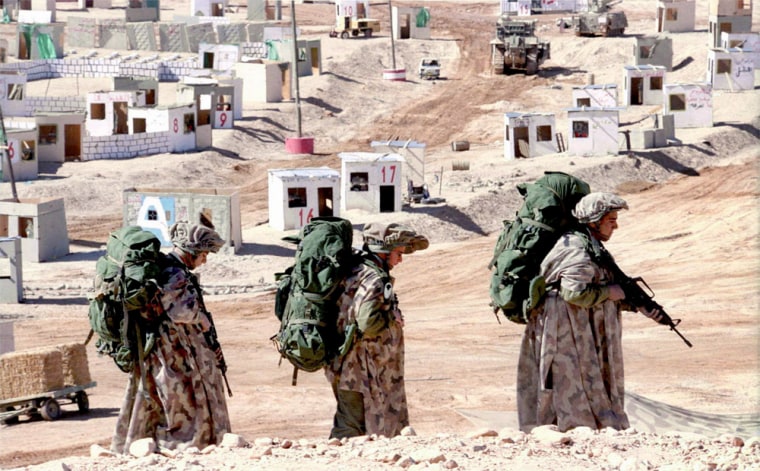In fighting insurgents in Iraq, the United States is drawing on some of Israel’s methods and experiences in the West Bank and Gaza Strip, including running checkpoints and tracking militants with drone aircraft, Israeli officials say.
Israeli and U.S. security experts have met repeatedly in recent months to discuss urban warfare and Israel’s lessons from its grueling three-year fight against Palestinian militants.
In public comments, Israeli and U.S. officials acknowledge “strategic cooperation” and confirm high-level meetings, the most recent one last week in Tel Aviv. However, they play down the contacts as routine, apparently for fear the Arab world will be outraged.
Recent U.S. methods in Iraq increasingly mimic those Israel uses in the West Bank and Gaza — setting up impromptu checkpoints, keeping militants on the defensive with frequent arrest raids and, in at least one case, encircling a village and distributing travel permits.
Israel briefs U.S. on use of drones
An Israeli security official, speaking on condition of anonymity, said Israel has briefed the U.S. military on its frequent use of drones, or unmanned reconnaissance aircraft, which allow officers at Israeli military headquarters to watch operations in real time.
Israel uses drones to monitor targeted killings, often helicopter missile attacks on fugitives’ cars. Israel has killed at least 117 terror suspects and 88 bystanders in targeted attacks.
The Israeli security official said Israel has taught the U.S. military how to make use of intelligence information within minutes to attack a moving target. The U.S. military has not formally adopted targeted killings, though some wanted Iraqis have been killed in arrest raids.
A U.S. Army officer, speaking on condition of anonymity, said U.S. troops try to stay clear of methods that look like collective punishment. Israel routinely demolishes the family homes of Palestinian attackers in hopes of deterring future attacks.
The British newspaper The Guardian recently reported Israeli advisers are training U.S. soldiers at Fort Bragg, N.C.
Lt. Col. Hans Bush, of the U.S. Army’s Special Operations Command, said there are no Israeli forces “currently teaching Army Special Operations Command forces at Fort Bragg.”
Last week, a large delegation from the Army Training and Doctrine Command in Fort Monroe, Va., visited Israel. Harvey Perritt, the command’s civilian spokesman, said the meeting was routine, but would not elaborate.
The Israeli army said in a statement it does not comment on “ongoing strategic cooperation between the U.S. and the Israeli military.”
But military officials close to the sides, who spoke on condition of anonymity, said the meetings focused on lessons learned from Israel’s fighting in the West Bank and Gaza and how to adapt them to Iraq.
Israel also gave the United States a training video for troops to illustrate an 11-point code on treating civilians, the rights of international relief groups and other issues “very tied into...the daily dilemmas” of urban warfare, said Lt. Col. Amos Guiora, commander of the Israeli army’s school of military law. The Israeli military recently began showing the video to its troops, amid persistent Palestinian complaints of mistreatment by soldiers.
Checkpoint doctrine
Israel has an entire doctrine on operating checkpoints: how many soldiers are needed for different types of blockades and how to differentiate between civilians and militants, said Eitan Ben-Eliahu, a former Israeli air force commander.
“These are details that only people who were involved in it for many years can know, and other armies, like the U.S. military, haven’t had ... enough experience,” he said.
Urban warfare is different from conventional fighting in every way, Ben-Eliahu said. Soldiers are often confronted with face-to-face battles against an enemy willing to commit suicide. And soldiers have to avoid killing civilians who mingle, knowingly or not, among militants, he said.
An Israeli security source said American officers have visited a mock-up of an Arab town used for Israeli training. Earlier this year, Israeli and American troops held joint exercises in Israel’s Negev Desert, focusing on air defenses.
Brig. Gen. Michael Vane, deputy chief of staff at the U.S. Army’s Training and Doctrine Command, acknowledged in a letter to Army Magazine in July that “we recently traveled to Israel to glean lessons learned from their counter-terrorist operations in urban areas.”
Israeli expert predicts U.S. defeat
Martin Van Creveld, an Israeli military expert, warned that just as Israel has been unsuccessful in eliminating militant groups and suicide bombers, the United States cannot expect to be victorious in Iraq.
Van Creveld traveled to Camp Lejeune, N.C., last year to lecture U.S. military officials on the door-to-door fighting that took place in April 2002 in the West Bank refugee camp of Jenin. Twenty-three Israeli soldiers and 52 Palestinians were killed in the battle.
“They are already doing things that we have been doing for years to no avail, like demolishing buildings ... like closing off villages in barbed wire,” Van Creveld said. “The Americans are coming here to try to mimic all kinds of techniques, but it’s not going to do them any good.”
In Iraq, the Americans have a more difficult task than Israel’s in the West Bank and Gaza Strip, Van Creveld said. Iraq is larger, the borders are open and there is almost unlimited access to arms.
“I don’t see how on earth they (the U.S.) can win. I think this is going to end the same way Vietnam did,” Van Creveld said. “They are going to flee the country hanging on the strings of helicopters,” he added, referring to the 1973 U.S. departure from Saigon.
